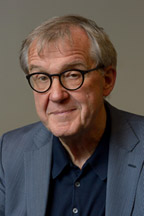Klaus Schulten
Klaus Schulten is a leader in the field of computational biophysics, having devoted over 40 years to establishing the physical mechanisms underlying processes and organization in living systems from the atomic to the organism scale. Schulten is a strong proponent of the use of simulations as a "computational microscope", to augment experimental research, and to lead to discoveries that could not be made through experiments so far. The molecular dynamics and structure analysis programs NAMD and VMD, born and continuously developed in his group, are used today by many thousands of researchers across the world. Schulten contributed key discoveries to several areas of biological physics: from quantum biology of vision, photosynthesis, and animal navigation to ion channels employed in neural signaling and to neural network organization of brain function; from mechanically gated channel proteins to muscle protein mechanics; from mathematical physics of non-equilibrium processes to numerical mathematics of the classical many-body problem. While Schulten's work remains solidly anchored to molecular detail, his most recent work has advanced to molecular cell biology and molecular systems biology via his group's structure analysis method, Molecular Dynamics Flexible Fitting, applied to systems such as the 300,000 atom ribosome and 4 million atom asymmetric HIV capsid. As of 2013, Schulten's work in biological physics has produced over 660 publications, which have been cited over 80,000 times (Google Scholar) as of August 2015. Schulten believes strongly in the importance of educating the next generation of scientists, having graduated 80 PhD students so far, many today in distinguished academic positions. He developed new courses and textbooks, and organizes a popular series of hands-on training workshops in which he has trained, in small groups, over 1,000 young scientists.
Klaus Schulten holds a Diplom degree in physics from the University of Muenster, Germany (1969), and a PhD in chemical physics from Harvard University (1974). He was junior group leader at the Max-Planck-Institut for Biophysical Chemistry from 1974 to 1980, and professor of theoretical physics at the Technical University of Munich from 1980 to 1988. Schulten came to the University of Illinois in 1988, and in 1989 joined the Beckman Institute and founded the Theoretical and Computational Biophysics Group, which operates the NIH Center for Macromolecular Modeling and Bioinformatics. Since 2008 he is co-director of the NSF-funded Center for the Physics of Living Cells. Schulten's awards and honors include: 2015 Biophysical Society National Lecturer, Blue Waters Professorship, National Center for Supercomputing Applications (2014); Professorship, University of Illinois Center for Advanced Study (2013); Distinguished Service Award, Biophysical Society (2013); IEEE Computer Society Sidney Fernbach Award (2012); Fellow of the Biophysical Society (2012); Award in Computational Biology (2008); Humboldt Award of the German Humboldt Foundation (2004); University of Illinois Scholar (1996); Fellow of the American Physical Society (1993); Nernst Prize of the Physical Chemistry Society of Germany (1981).
| Publications | Invited Lectures | Related Info | |||




